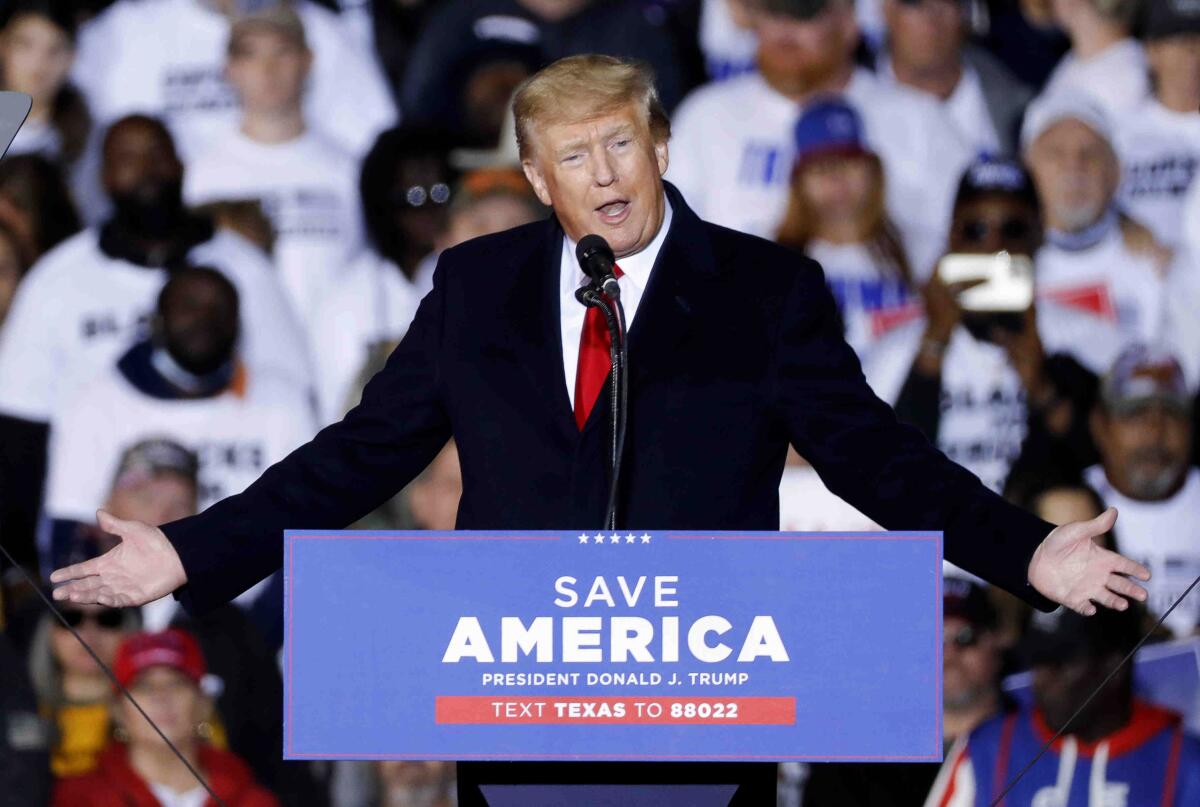Opinion: Has an ex-president ever threatened the country like Trump?

Good morning. I’m Paul Thornton, and it is Saturday, Feb. 5, 2022. Let’s look back at the week in Opinion.
Some of you will snivel and stop reading when I mention his name, so let’s get it out of the way: This newsletter leads with a discussion on Donald Trump, who in a fair world would command none of our attention, but this is a world in which a two-time popular vote loser became president once, so I’d hardly describe the situation as fair. That said, former President Trump is an incredibly important figure in American life — in the same sense that smallpox and polio are incredibly important to virologists — and watching him closely is crucial, as much as it may repulse us.
After all, it’s unpleasant to fixate on something dangerous, and right now, even as a twice-impeached ex-president, Trump is as dangerous as he’s ever been — both because of what he’s actually doing, and because of what he’s making us do. We’ll start with what he’s doing now.
Last Saturday, the former president told supporters at a campaign-style rally in Texas that he may consider pardoning those arrested in connection with the Jan. 6, 2021, insurrection if elected president in 2024. This comes as a flurry of new information before the House committee investigating the attack puts Trump closer to the center of a concerted effort to overturn the 2020 election, and the hundreds of people being prosecuted or questioned in connection with the insurrection may be less inclined to assist investigators with a pardon dangling over their heads. Trump arguably abused the pardon when he was president; he continues to do so while out of power in an attempt to thwart the hardening of our elections against another attack like the one he instigated.
As The Times Editorial Board put it, “In the Trump era, the assumption that every president will act honorably is out the window, and the need to fine-tune the government’s checks and balances is paramount.”
As for what the ex-president is making us do, we already have a system for deterring attempts to illegally meddle in elections and obstructing Congress from performing its core functions: the criminal justice system, and an effort is underway in at least two sub-federal jurisdictions to hold Trump accountable. It was the fact that criminal probes in Georgia and New York are being led by Black prosecutors that prompted Trump to label the investigators “racists” (no word on if he is similarly concerned for the countless Black Americans sent to prison by white prosecutors and judges), and it was in the same rant that he dangled pardons for Jan. 6 defendants.
And right now, says columnist and former U.S. attorney Harry Litman, the U.S. Department of Justice has plenty of evidence to indict the former president, and largely because of his own public utterances: “Under Justice Department prosecution standards, just the publicly available evidence is sufficient to bring an indictment against Trump for the federal crime of obstructing or impeding an official proceeding — in this case, Congress’ certification of a presidential election.”
But as Litman notes, Trump would be no ordinary defendant, and the decision whether to pursue such an unprecedented prosecution would be kicked all the way up to President Biden. It is here that Trump is forcing us to make a gut-wrenching decision: Do we uphold the rule of law but set off a partisan firestorm by indicting the former president over conduct that would surely get anyone else arrested, or do we fatally weaken our democracy by giving into the harsh political reality that Trump created and wait for the voters to decide his fate in 2024?
The fact that any president or Justice Department might have to make this choice doesn’t speak well for the rule of law in this country or the durability of our democratic system.
Now that L.A.’s attention is on football (go Rams, by the way), let’s hope we give plenty of thought to the case of Brian Flores, the ex-Miami Dolphins head coach suing the NFL over racial discrimination in hiring practices. Columnist LZ Granderson says it’s time for NFL players to fight for Black coaches like Flores: “They have to not only raise their voices but they have to follow that up with action, whether that’s a summit like the one Black athletes held in Cleveland in 1967 in support of Muhammad Ali or a flat-out work stoppage. Something has to change about the lack of Black head coaches in the league, and it is clear that change won’t be initiated by the people doing the hiring.” L.A. Times
Houston can teach Los Angeles a lot about solving homelessness. Yes, there are important differences between the two areas — land and housing are a lot cheaper in Texas’ largest city — but Los Angeles does not take advantage of all the tools that, as Houston’s experience shows, are available to it. Journalist Marshall Ingwerson writes: “Here’s what makes progress hard in Los Angeles: No one’s in charge. Individual leaders buzz with impatience for action; saintlike individuals produce quiet acts of compassionate heroism — but the systems exude a muddy lack of urgency.” L.A. Times
Thinking of buying a gun for self-defense? Don’t do it. This is a compelling anecdote from ER doctor Steven J. Sainsbury: “During my more than 25 years as an emergency medicine physician, I treated hundreds of patients with gunshot wounds. I treated criminals who shot each other. I treated gun owners who killed their family members in drunken rages. I pronounced dead suicide victims who shot themselves with an easily accessible handgun in their home. Yet in all those years of emergency medicine, I never treated a single patient who was shot by a law-abiding citizen in self-protection. Not one.” L.A. Times
Enjoying this newsletter? Consider subscribing to the Los Angeles Times
Your support helps us deliver the news that matters most. Become a subscriber.
Math anxiety is real, and we’re passing it on to our kids. Our brains are not hard-wired for arithmetic; even learning to count sets off complicated neural signals that involve our fingers. So we should stop treating the instruction of math to children as the imparting of self-evident, God-given, eminently logical reasoning, writes Michael Brooks: “Mathematical concepts are ... tough to figure out to begin with and can be difficult to explain to even the sharpest minds. It makes sense that they remain hard to understand for many people. Yet we expect 11-year-olds just to comprehend them and move on.” L.A. Times
Hey, politicians, if you make a rule you’ve got to follow it too. The sight of unmasked politicians at SoFi Stadium on Sunday understandably sent many diligent Angelenos into a rage, especially the parents of children told to wear their masks outdoors during recess. The Times Editorial Board shares advice with the likes of Gov. Gavin Newsom and Mayor Eric Garcetti that would make sense to a lot of children: “Newsom and Garcetti are among the government leaders saying that masks are necessary in crowded settings. If they expect people to follow the rule, they must show that they’re following it too.” L.A. Times
Stay in touch.
If you’ve made it this far, you’re the kind of reader who’d benefit from subscribing to our other newsletters and to the Times.
As always, you can share your feedback by emailing me at paul.thornton@latimes.com.
A cure for the common opinion
Get thought-provoking perspectives with our weekly newsletter.
You may occasionally receive promotional content from the Los Angeles Times.




